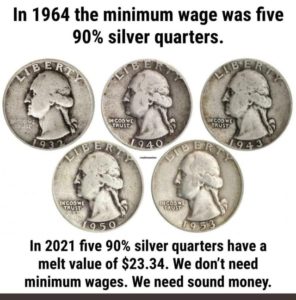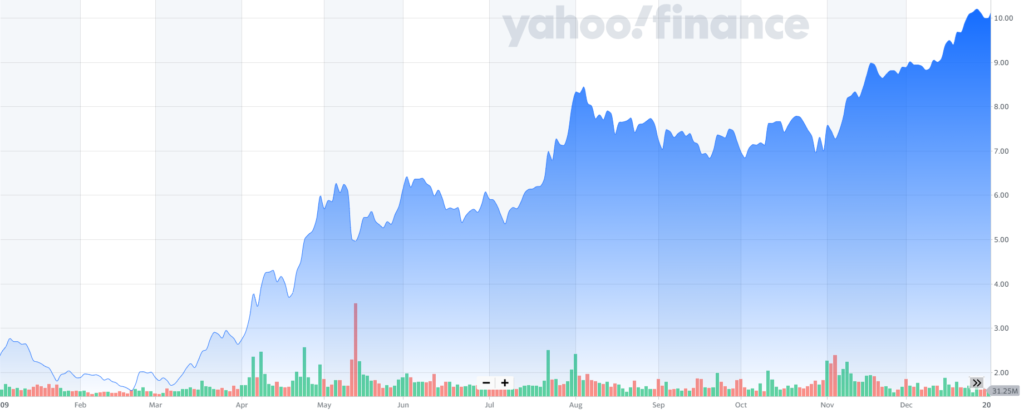“Inflation is a tax that disproportionately affects the poor.”
It’s been famously stated that those who do not understand history are doomed to repeat its mistakes. Similarly those who do not understand the difference between Wealth, Value and Currency are doomed to be adrift on the economic sea, at the mercy of the winds of monetary policy. The seminal work on this is Henry Hazlett’s “Economics In One Lesson” which you can read online or download for free courtesy of the Foundation for Economic Education.
Very recently I had a conversation with an advocate for cryptocurrency who insisted that crypto was a thing of value. I consider this person very smart, but as Hazlett himself points out, “…so powerful is the verbal ambiguity that confuses currency with wealth, that even those who at times recognize the confusion will slide back into it in the course of their reasoning.”
So let’s define the terms clearly
Wealth
Your wealth is only ever your health, your liberty and your happiness. Absent any one of these three you are not truly wealthy. You can use your wealth as labor to acquire things of value. Too many people waste time neglecting one of the three, but if you have bad health, no liberty or are truly unhappy, you would gladly rebalance the scale to get what you are missing. That rebalancing involves exchanging some aspect of your wealth (usually your liberty and happiness by taking a job) to acquire other things of value.
Value
Things of value have a utility by the nature of their existence. While the amount of value a thing posesses may vary from person to person, the value itself is intrinsic. Gold is a thing of value because of it’s myriad of uses. The value of gold to you varies on how important your cellphone, laptop or computer is to you, because none of those items can be made without gold. Likewise gold is very valuable in jewelry and dentistry, though again that value varies from person to person. If you’ve ever suffered horrible dental pain that was fixed by a gold crown, that gold was probably very important to you at the time.
And gold is a limited resource. If you assembled all the gold in the world, both discovered and undiscovered, it would make a cube 67 feet x 67 feet x 67 feet.
Other things of value: land, food, your private property like a car, and people’s labor. Again, value is in the eye of the beholder, but as we mentioned when someone is willing to give up some of their wealth to work (using their liberty temporarily), they create value. That value is determined by the people who consume the services, and the skills of the laborer. The current value of my labor on the free market as a computer programmer is currently quite high. The value of my labor as a fashion designer is practically nonexistent.
A thing of value may be directly traded for another thing of value, in a process called bartering, but there is a fundamental truth that two people don’t trade anything unless both believe that they are wealthier after the trade. Otherwise, why would they make the trade?
If I have an ounce of gold, it’s very awkward for me to buy a head of lettuce with that. The value of the items are not the same. Similarly how can two people who’s labor is value differently come to terms? If I, as a landscaper, who charges $15/hour for my services, want to see a doctor who charges $300/hour for her service, I cannot make a deal if she doesn’t need 20 hours of landscaping. On the other hand, if I could perform 20 hours of landscaping for a variety of clients, and they all paid me in a currency that we agreed upon, it’s easy for me to give that currency to the doctor. Currency makes trade easier and more common. And more trade makes everyone wealthier.
Currency
Currency is a means of exchange. Currency is used to abstract the value of something to a medium that can be easily traded. My ounce of gold might be very valuable to some people, but if my local grocer has no interest in it, I cannot buy food from him. If I can sell my gold for a currency that my grocer accepts, I can buy food and have plenty of currency left over.
In the Colonial United States, Tobacco leafs were often used as currency because they had a minimal intrinsic value. The Wampanoag tribe who hosted the first Thanksgiving used shells called “wampum” as currency for the same reason. The problem with such currencies is that they could be damaged in handling. In Virginia there were Tobacco warehouses that would store tobacco leaves and issue “tobacco notes” that could be redeemed for the stored tobacco leaves. People were then able to trade those notes as currency, and anyone in possession of the note could claim the tobacco.
A currency which is directly redeemable for a thing of value is referred to as “Hard Money.” You can at anytime redeem the currency for the thing of value it represents. The United States government originally used hard money currency such as gold notes, as well as gold and silver coins for a long time, following the European model of gold and silver coins. Monarchs in Europe however often re-smelted their gold currency to be less pure, keeping the excess gold for themselves, devaluing the currency. The fundamental American pennies used to be made of copper. Pennies from before 1982 contain $0.017 worth of copper on today’s market. The government switched over to using zinc for pennies, but now zinc prices are rising…
All governments today use “fiat” currency, in which the money is backed only by the idea that the government says it is valuable. The government enforces the value of it’s fiat currency by being the largest purchaser and largest producer in the economy. If your government employs 5 million people and pays them all in currency, it is essentially assigning the value of their labor to the currency amount the government says it is, which inversely impacts the value of the currency itself.
So where is the risk? It’s important that people understand that while a thing of value is valuable in any context, currency is only valuable to those who wish to trade with it. And currency can be devalued. Governments do this often. When the United States government wanted to address the collapse of the stock market in 2008, it introduced a program called “Quantitative Easing” where the Federal reserve bought 48 billion dollars of stock every month. And stock prices rose. Consider the value of Ford Motor Company (Stock symbol F). The below chart is from January 1 2009 to January 1, 2010
The stock price increase 1000% from it’s lowest point. Did the company truly become that much more valuable? Ford was not selling 10x as many vehicles. Their profits actually decreased over that time span compared to the previous year. The value of the company itself, it’s capacity to make things of value and sell them for currency, stayed roughly the same. So why did the currency evaluation of Ford go up so much?
The value of the company, as measured by currency went up because the government printing money devalued the currency. This was in fact the greatest transfer of wealth (wealth, not currency) from the the saving class (people who store currency in banks) to the stock holding class.
 Similarly when minimum wage was $1.25 per hour in 1964 quarters were made of silver — a currency made out of a thing of value. If quarters were still made of silver, the minimum wage could still be $1.25 per hour, thereby benefiting employers. But the value of those 5 silver quarters, is approximately $23.31 in today’s Dollars. A fiat currency — one which represents a thing of value, but is not actually valuable itself, is easily manipulated. The “value” of currency is related to what people are willing to trade for it. If no one wants to trade for your currency, it has no value. If noone wants to trade for your land, you can still grow food on it.
Similarly when minimum wage was $1.25 per hour in 1964 quarters were made of silver — a currency made out of a thing of value. If quarters were still made of silver, the minimum wage could still be $1.25 per hour, thereby benefiting employers. But the value of those 5 silver quarters, is approximately $23.31 in today’s Dollars. A fiat currency — one which represents a thing of value, but is not actually valuable itself, is easily manipulated. The “value” of currency is related to what people are willing to trade for it. If no one wants to trade for your currency, it has no value. If noone wants to trade for your land, you can still grow food on it.
Right now crypto currencies are very popular and people like to trade with them. I personally love crypto becuse it’s not backed by any government, the transactions are (mostly) anonymous, and no government can devalue the currency by creating more.
But make sure you recognize that any crypto is a currency. Currency trading can be very profitable, but you want to make sure you’re not the person left holding the bag when the currency is no longer in vogue. Your labor will always be worth something, even if it’s not as much as you’d like. Your currency however is dependent on how much others are interested in acquiring it. If you want your welath to be independent of the actions of others, acquire things of value, and don’t put faith in a large pile of currency.
If you liked this article, please sign up for the People For Liberty newsletter to be kept up to date on our efforts to promote the #LibertyLifestyle and #ConsentCulture.

